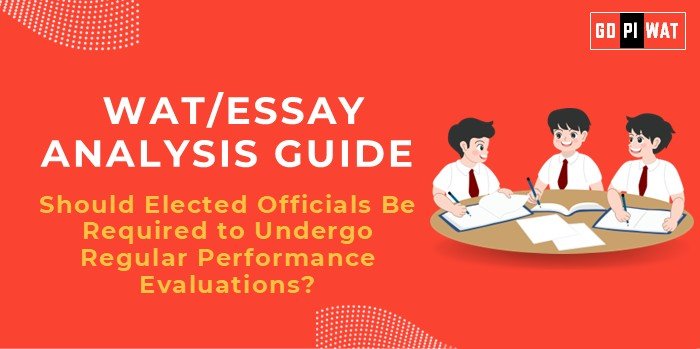📋 WAT/Essay Analysis Guide
Should Elected Officials Be Required to Undergo Regular Performance Evaluations?
🌐 Effective Planning and Writing
- Time Allocation: 5 minutes for planning, 20 minutes for writing, 5 minutes for review.
- Preparation Tips: Focus on global examples, feasibility challenges, and potential solutions to make your arguments robust and relatable.
✍️ Introduction Techniques
- Contrast Approach: “While corporations thrive on regular evaluations to ensure accountability, elected officials often face no such systematic scrutiny.”
- Solution-Based Approach: “Implementing regular evaluations for elected officials could redefine accountability and transparency in governance.”
📊 Structuring the Essay Body
- Achievements: Highlight successful governance improvements through evaluations or citizen feedback mechanisms, such as Estonia’s e-Governance system.
- Challenges: Discuss political resistance, logistical constraints, and the risks of politicization.
- Future Outlook: Suggest solutions like tech-enabled feedback systems, independent agencies for evaluation, and global benchmarking to ensure fair implementation.
📄 Concluding Effectively
- Balanced Conclusion: “Performance evaluations for elected officials, while challenging to implement, hold immense potential to strengthen democratic accountability.”
- Solution-Oriented Conclusion: “Transparent frameworks and independent evaluations can ensure fair assessments, fostering public trust in governance.”
🌟 Recommendations for Sustainable Progress
- Develop clear, measurable, and non-partisan evaluation metrics.
- Integrate citizen feedback with technology for impartial and efficient assessments.
- Leverage global best practices, such as Estonia’s tech-enabled feedback systems, to ensure scalability and inclusivity.
📚 Sample Short Essays
- Balanced Approach: “Regular performance evaluations for elected officials offer a pathway to enhance accountability, but their design must address challenges like subjectivity and political misuse.”
- Solution-Oriented: “Transparent and tech-driven evaluation systems can ensure elected officials remain accountable, responsive, and efficient in governance.”
- Global Comparison: “From Estonia’s e-Governance to Switzerland’s direct democracy, global examples illustrate the benefits and challenges of performance evaluations for public officials.”


